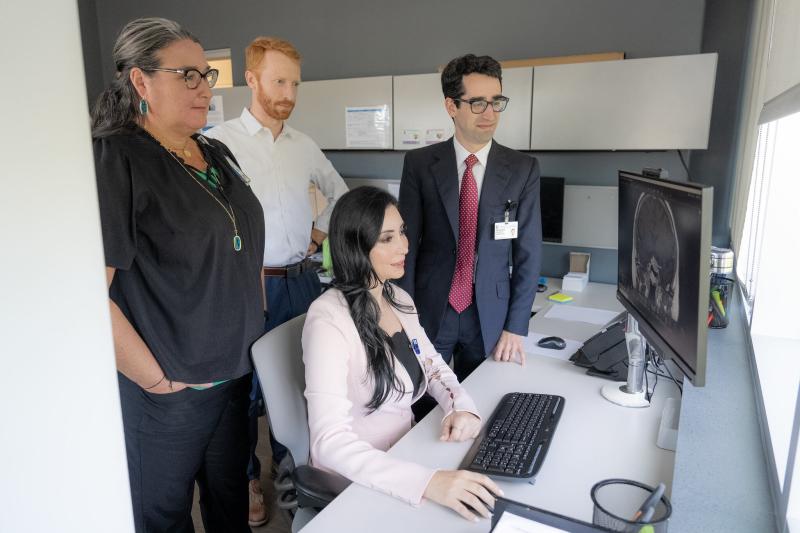
For Leena Shahla, MD, pituitary disorders are more than medical conditions—they're complex puzzles that require precise diagnostic and therapeutic strategies. “As I realized the significant impact of the pituitary on the endocrine system, I found the challenge of diagnosing and treating pituitary conditions fascinating,” she shared. This passion led her to specialize in pituitary disorders and, in July, to join the Duke Department of Medicine (DOM) as medical director of the Duke Pituitary Center.
In just a few months, Dr. Shahla has secured key designations for the center, including official recognition as a “Center” and a Pituitary Center of Excellence by the Pituitary Network Association. Her leadership is advancing DOM’s capacity to treat rare and complex pituitary disorders through a multidisciplinary, research-driven approach.
Coordinated, Specialized Care for Complex Pituitary Disorders

Dr. Shahla’s journey into pituitary medicine began during her medical training and evolved through years of clinical experience. She previously initiated the pituitary tumor board and perioperative protocol at the University of Florida, Jacksonville, and established a dedicated pituitary clinic at the University of Arizona, Phoenix. Now at Duke, she is the medical director of a multidisciplinary team that includes specialists in neurosurgery, neuro-ophthalmology, radiation-oncology and endocrinology, working together to provide comprehensive care for conditions such as acromegaly, Cushing’s disease, and pituitary tumors
“Pituitary disorders are diagnostically challenging due to their nonspecific and variable presentation,” Dr. Shahla noted. “Many cases, especially Cushing’s and acromegaly, are not detected until the disease is advanced. Our team’s ability to provide high-volume, specialized evaluations is critical for improving outcomes.
Patients often require extensive diagnostic workups, including dynamic endocrine testing, advanced imaging, and surgical evaluation. By consolidating these services, the center minimizes diagnostic delays and ensures that comprehensive treatment plans are developed efficiently. Hormone-secreting pituitary tumors demand individualized, multimodal treatment strategies involving surgery, pharmacologic management, and radiation therapy.
“Our surgical approach is complemented by continuous endocrine monitoring to address residual disease or recurrence,” Dr. Shahla explained. “Hormone normalization is not always immediate, and long-term management is essential to prevent complications.” Emerging therapies, such as newer somatostatin analogs and glucocorticoid receptor antagonists, further enhance the center’s capacity to individualize treatment.
“Even when surgical resection achieves partial or complete remission, follow-up care is necessary to maintain hormone control and detect recurrence early,” she emphasized. “Our multidisciplinary review of cases ensures that therapeutic adjustments or interventions are made as needed.”
Research and Innovation: Driving Advances in Pituitary Care
Dr. Shahla’s current research focuses on improving early detection and long-term outcomes for patients with pituitary disorders. This includes developing a cutting-edge tumor detection method to classify tumors and facilitate precise tumor removal, as well as creating a pituitary disorder website where Dr. Shahla describes each disease, symptoms, diagnosis, and treatment so it is informative for patients and the general population. And finally, creating a postoperative protocol to follow at Duke
“PCOEs [Pituitary Centers of Excellence] move medicine forward by closing gaps in knowledge, improving patient outcomes, and setting new standards in the care of pituitary diseases,” Dr. Shahla explained.
“The Duke Pituitary Center’s goal is to be at the cutting-edge of clinical trials for new medications and surgical techniques and to contribute to basic science research to better understand pituitary gland biology, hormone regulation, and tumor development,” Dr. Shahla explained. “Innovation extends to advancing treatment techniques, including minimally invasive surgery, novel medical therapies targeting hormonal pathways, and safer, more precise radiotherapy options.”
Educating Providers and Building Future Expertise
Education and advocacy are integral to the center’s mission. By training future experts, offering patient education resources, and conducting awareness campaigns, the center promotes early recognition of pituitary disorders within the medical community and the general population. Additionally, its involvement in developing and maintaining large patient registries supports data-driven research and global collaboration, helping improve care standards worldwide.
“Primary care providers frequently encounter early indicators of pituitary disease but may not recognize the need for further testing or referral,” Dr. Shahla said. “Increasing awareness of these signs will help direct patients to specialized care sooner.”
Telemedicine consultations further extend Duke’s reach, ensuring that patients in regions benefit from the center’s expertise. The center also collaborates with community providers to provide guidance on diagnostic testing, referral pathways, and long-term management of complex cases.
A Vision for the Future
Reflecting on her journey, Dr. Shahla acknowledges the challenges she faced coming from Syria. “My journey to reaching my current role has been both challenging and rewarding, highlighting my dedication and perseverance,” she shared. “I am deeply grateful to Duke for placing their trust in me and supporting me along this path.”
With the Pituitary Excellence Center’s infrastructure firmly in place, Dr. Shahla plans to expand the program’s research initiatives and clinical trials. Ongoing collaborations with radiology and neurosurgery will explore imaging-based risk stratification to predict tumor invasiveness and recurrence.
“Our research is clinically driven, with an emphasis on improving diagnostic accuracy and identifying novel therapeutic targets,” Dr. Shahla said. “As we expand our clinical trial portfolio, we aim to provide patients with access to emerging therapies while contributing to advancements in pituitary care.”
Under her leadership, the Duke Pituitary Center will continue to grow as a regional and national leader in pituitary care. By integrating clinical excellence, research innovation, and collaborative care, the center aligns with DOM’s mission to provide high-impact solutions to challenging medical problems.
“The complexity of pituitary disorders demands a collaborative approach, and at Duke, we’re building on that foundation,” Dr. Shahla said. “Our program is designed to address not only the current needs of patients but also to anticipate the future landscape of pituitary research and treatment.”